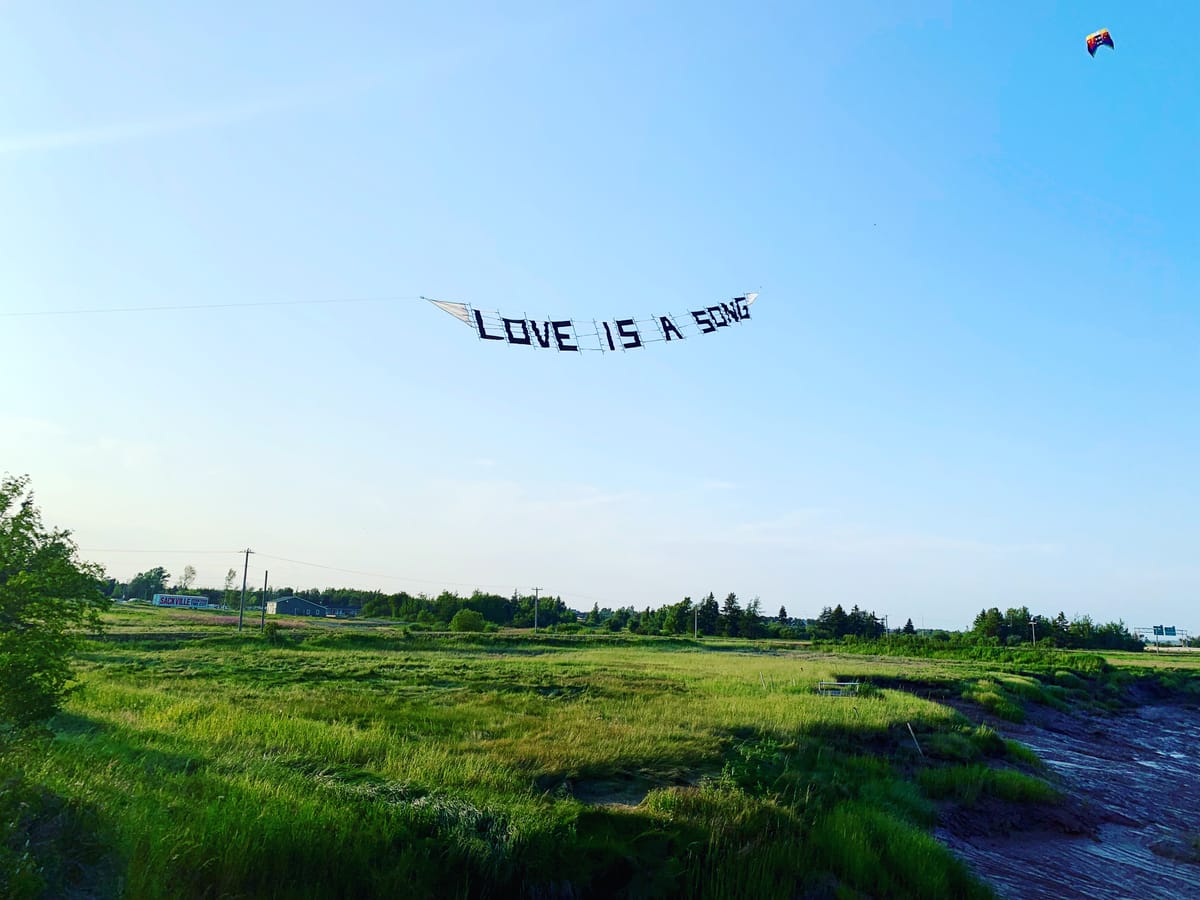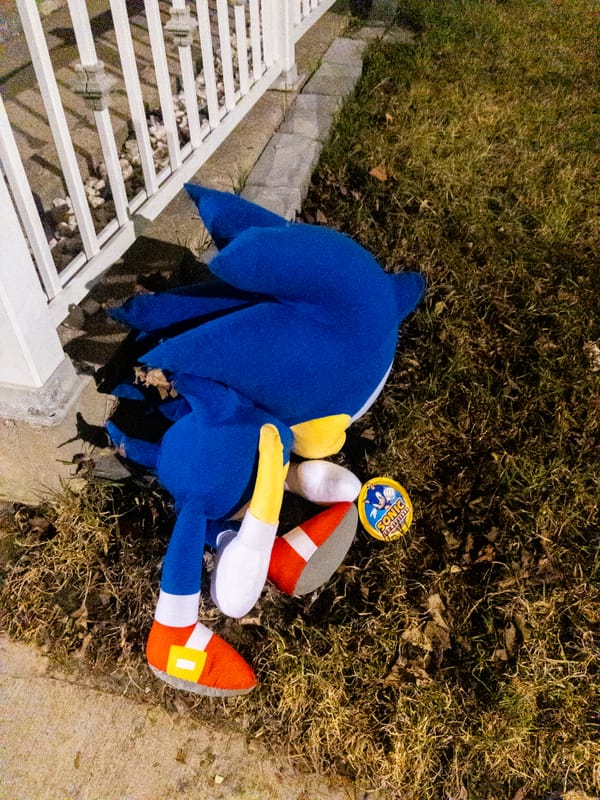Haystack charm around your neck
When did we become so banal and unserious that sadness and the songs that sing it aren’t allowed in polite company anymore?

tw: mentions of suicide and alcohol
I have to be cautious with this, because it requires a telling of secrets. Not secrets like, I know who DB Cooper is or your cat comes to my house every day for lunch and I have given her a different name, but secrets as information shared between green circles in an instagram story. Mundane maybe, but real. Secrets shared between friends and connections on apps designed to be conversational, but only a little.
I’m being cautious because I actually don’t remember if this was a green circle or not.
Information sometimes passes through me on its way to being half-remembered somewhere. Like a shadow moving in the early hour of the day when my eyes are half on and my brain half off. Never quite sure what I saw, but certain it was something. Close friends, or something sinister moving in the dark. Who’s to say.
This potentially green circle and thus anonymized Instagram story was talking through a complaint at a restaurant about the choice of soundtrack. More specifically, this particular guest was sitting for a nice meal, one at an affordable but considered price, maybe with a drink, maybe joined by a lover or maybe a friend or maybe both. Who’s to say.
The complaint is that at one point in the evening, “Needle in the Hay” by Elliott Smith came on.
You can almost picture Richie Tenenbaum in his sunglasses and tennis gear trimming his beard and buzzing his hair, the faint sound of a razor as it trims the last remnants of facial hair on tired skin staring into a mirror whispering I’m going to kill myself tomorrow just as everything falls apart one last time – a secret shared between no one in particular – A quick series of cuts, then blood, then frantic motion and panic and hospitals.
Green circled revealed.
There is very little arguing the truth of whether or not this is a fucking sad song as it draws up the spectres of sad and ominous feelings. It’s hard to divorce the sadness of this flash of challenging emotions from Elliott Smith’s life. Smith killed himself in 2003, two years after the above scene in what some (me) might say is Wes Anderson’s best movie; The Royal Tenenbaums .
Wes Anderson used to tell stories, they used to feel real and lived in and sad and beautiful all at once and somewhere along the way his work sometimes feels more like a book of all his tropes and cliches you might buy at an Urban Outfitters more than the truth of it and I worry that a desire for whimsy has destroyed all the heart behind it. I will still see every movie he makes, I will wait for them to cut me where no one will see and I rarely leave having drawn blood.
Smith is largely considered to be a sad songwriter, due to the starkness of his work, the reality of his death by suicide, and the truth of his life as someone who struggled with addiction. He is sad, and sadness is without context or virtue. Sad just is, a kind of purgatorial emotion best kept somewhere away from all living and happy things out in the world. Sad belongs behind a bathroom door, closed and protected. Sad should leave the room to cry. Sad doesn’t deserve to exist anywhere but in all the dark places it thrives, like a snake plant.
When did we become so banal and unserious that sadness and the songs that sing it aren’t allowed in polite company anymore? That once music hits a certain emotional chasm it is no longer allowed to move into a playlist that might shift in tone over the course of night. That only the just and righteous emotions exist in the world of man and the sad and dark ones hide where they are unwanted and feared.
If you want the soundtrack to your night out to be perfect, without challenge or strife, have you considered growing the fuck up just a little bit?
I’m guilty of this too, I have more than once tweeted Stores should have a little sign on the door that warns you they might play “Fade Into You” , a statement I firmly stand behind. It’s not that it’s unwelcome, it’s that it is a lot sometimes and I just want to know if I’m going to feel something today beyond “do we have mustard, and is it the good kind?”
We don’t, we never will.
You can argue with me that it’s too much to be sitting down for dinner in a nice restaurant with good lighting and a great menu and nice staff, the specials tonight and the ambient conversation of a room, and be expected to listen to “Needle In The Hay” but I’m not on board for this line of thinking. I think you’re more afraid of confronting what “Needle in the Hay” is asking you to feel more than whatever moralizing about its placement on a playlist you can conjure.
This is something I miss as an alcoholic in good sober standing. I used to work as a bartender in a high-end cocktail bar in downtown Whitehorse, in a building with taxidermy moose on the roof locked in a vision of battle that used to be a yarn store when I was a kid. It eventually became a place where you could spend 20 dollars on a single glass of scotch and a years wages on a perfect evening. I think about that scotch often, as brown liquors were the ones that got me and even now, years after I put the last one down, I can feel how they smell and burn, the wincing on my face and the pulling of air into tired lungs and the way they made my head spin.
We used to make playlists for the bar and they were generally upbeat and meant to encourage good times over bad but we still wanted them to feel something, like a bitter rind clinging to the edge of a glass. We spent an entire evening making drinks listening to Thee Oh Sees until someone asked us to stop and put on something fun with melody and danceable rhythms and only then did we turn the music up just a little.
The music isn’t always there to please you, it’s not always there for you at all, but it’s always there, and you can choose how you live with it. When the music we played on the stereo confronted or confused people, often only the brave and lonely drinkers sitting at the bar would ask about it.
They might ask what the song is, or tell a story about a lost love who put this song on her morning playlists, the one she made for when she was making the kind of perfect cup of coffee left behind in memories by someone who has since gone away. Sometimes we all felt too much together in a moment, and then I would say that all shots are whiskey and pour two glasses, down one for me while I was sure no one was looking to see the bartender start to stand unsteadily on her feet.
We talked about them, we lived in our hard and sad feelings, shared them like heirlooms between trusted friends and loved ones. Look here and where there are cracks in the porcelain of this life and behold the beautiful miracle of time as it makes lines on our skin.
This, to me, is what a sad song does. It makes lines in us, leaves them there to be recalled. Elliott Smith wrote sad songs, but he wrote them with tremendous beauty and heart, writing to the world around him. The mistake people make with songwriters of his ilk, perceived only ever as sad and self destructive, is that they were writing inward, to the pain running through them. The misconception of sadness.
All the whimsy and desire of this world is nothing without sad and challenging feelings as a counterweight to make it all mean something. To give this life stakes and signposts that show the places we have been, the blood we left behind and all the places we may go from here. You can make everything perfectly centered on screen, with pastel colours and wry wit but it means nothing without something dark in the corner giving it strength.
In truth, these are songs of observation. Looking at the world, processing and transmuting it into soft chords on a guitar, or pianos played with expert and chaotic rhythm. A voice that always feels like its holding back, or maybe its just holding on. “Needle in the Hay” isn’t so much about Smith, it’s about dependency and desire, it’s about the infiltration of drugs to communities and the impact starting to make itself known.
And yes it’s kind of sad, it’s a kind of sad that’s beautiful to talk about and share. And maybe it’s shared only between your meal being delivered and the wait staff asking how the first few bites are going but maybe this is were you are at your most alive anyway, and maybe this is what you will cherish without noticing. What's important is the sharing of it, even just for a moment.
Sadness and all its associated feelings too often relegated to the green circles of all our conversations, all around and within me I feel this urge to push sadness into the places where no one can see or talk about it and it’s not any one person’s fault but maybe if we were more open to one perfectly beautiful and sad song playing on a speaker fastened to the corner of the ceiling there would be more space around you for the people who are feeling and processing all of these hard and difficult things.
Whoever left that review complaining about the sadness of a single song on a well considered and thoughtful playlist will go out into their life and share a story about the time they were eating and fucking Elliott Smith came on, people will laugh and expel surprise and not once will it dawn on any one of them that this one moment is the perfect kind of dark place, one where a snake plant will grow, a story of sadness to share with friends and loved ones time and again.
The need for music and ambiance to only ever please us, to reinforce our desired ideals is a losing game, the product of a life lived with far too little observation or reflection. Songs of challenging origin are an opportunity to open and share, to be made vulnerable but with the help and support of someone else. Learn to let your guard down, let your feelings hang low and dark when they need to. Sit and recount the perfect memory of a time that will never be true again and maybe never was. Feel all of your destructive feelings and be made better for it.




